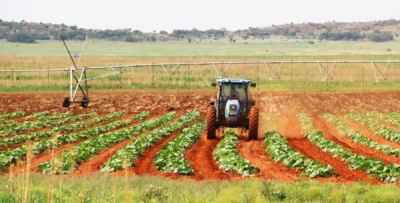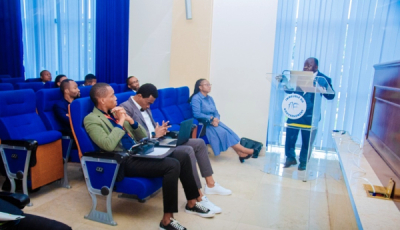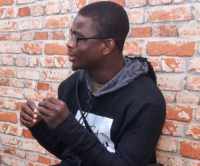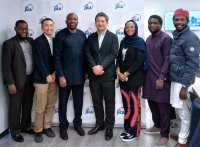The talented entrepreneur combined tech tools and his experience in the event industry to offer an innovative solution to help event specialists in their work.
Haythem Dridi (photo) is the founder of the tech company Millesima Technologies. The Tunisian-born entrepreneur is a Mathematics and Physics graduate from the Faculty of Science of the University of Sfax, Tunisia. He is also a certified project manager.
Millesima Technologies, the startup he manages as the CEO, is a Startupact-certified Tunisian company. It specializes in data and on-demand video streaming. The startup launched in 2021 also offers face-to-face, hybrid and virtual solutions to event specialists.
In late 2022, it raised US$480,000 from private equity firm BH Equity to launch MYVIOO, a digital platform that allows firms and organizations to launch free or paid on-demand video and live-streaming channels that can be used as advertising spaces.
Haythem Dridi's entrepreneurial adventure began with the creation of Millesima Travel and Millesima Events in 2004. Millesima Travel is a licensed Tunisian travel agency specializing in B2B hotel booking and business travel management.
Meanwhile, Millesima Events is an events agency based in Morocco and Tunisia. The agency has already worked with 794 clients and organized 2,596 national, 60 overseas, and 150 virtual and hybrid events.
It is somehow the originator of Millesima Technologies, which was launched to allow it to continue its operations when the coronavirus pandemic forced a cessation of face-to-face events.
Melchior Koba
The solution aims to keep users healthy and prevent some diseases like obesity, diabetes, and asthma, which have recently been on the rise in Africa.
Lifesten Health is a digital solution developed by a Rwandan start-up that allows users to lead a healthy lifestyle. It creates personalized exercise and diet programs for each user.
Users can register on its web platform or via its mobile app (available for Android and iOS devices) and answer several questions to allow the solution to set up a personalized profile. Based on that profile, Lifesten Health creates "daily personalized challenges that involve activities to improve [...] diets, physical activity, and mental wellness."
Recognizing that it takes a lot of discipline to keep up with the challenges, the start-up behind the solution has come up with an incentive system that awards points to be exchanged for goods and services such as medicines, consultations, subscriptions, and even spa treatments at partner companies. Lifesten has also developed a program to encourage employers to enroll their employees to boost their productivity.
In addition, it keeps a frequently-updated blog that discusses wellness, exercise, lifestyle, diseases, and even news related to its development.
Adoni Conrad Quenum
The solution aims to help farmers and fresh produce farmers quickly sell their products while ensuring farm traceability.
Mahaseel Masr is a digital solution that connects farm owners with buyers looking for fresh products. According to Mohamed Abdel Rahman, founder of the startup behind the app, "demand for first-rate fruits and vegetables at competitive prices is showing strong growth, driven by a global rapid population increase and raised digital awareness, in addition to a demanding need for global supply chain stability." Therefore, the solution wants to facilitate secure and reliable transactions while ensuring farm traceability.
Through its Android app, the solution allows buyers and sellers to create their accounts and carry out business transactions. Buyers must type the product they need into the search bar and choose the farms offering such products depending on the location.
Mahaseel Masr claims more than 28,000 member farms and more than a million tons of crops harvested and sold. On Play Store, its Android app has been downloaded more than a hundred times.
Adoni Conrad Quenum
With Moja Ride, he successfully transformed mobility in Côte d'Ivoire, where public transportation is poorly organized.
Jean Claude Gouesse (photo) is an Ivorian entrepreneur and the co-founder/CEO of Moja Ride, a mobility aggregator based in Côte d'Ivoire.
His mobility startup, founded in 2017, connects informal transportation modes on a single platform. It also provides a ticketing platform that allows transport operators, and cab and minibus drivers to track their earnings and offer unsecured car loans all thanks to the Moja Wallet that enables drivers to save and borrow funds and pay for expenses.
The startup has launched a contactless card and QR code payment technology to make it easier for users to pay for their rides. The said users can also buy their tickets online.
Before Moja Ride, in 2016, Jean Claude Gouesse co-founded Bouttic Technologies, which offers business management solutions. Three years earlier, he also co-founded fintech company R.A.T.E.S MONETIC, the brain behind the solution eCash Express, which aims to 'redefine the mobile money revolution through easy-to-use and affordable payment solutions."
Between 2014 and 2015, in Seattle, USA, he participated in Techstars' Startup Weekend, "a three-day program where aspiring entrepreneurs can experience startup life."
Let's note that Moja Ride is among the eleven startups selected to participate in the third cohort of the Africa Startup Initiative Program (ASIP), an acceleration program organized by Startupbootcamp Africa and Telecel Group.
Melchior Koba
DR Congo, which is confident that ICT tools can greatly contribute to emergence, is focused on building a unique digital ecosystem.
DR Congo is currently preparing for the upcoming launch of its intranet project in line with its strategy to digitize and modernize public services. The project was presented by the Ministry of Digital Affairs, last Thursday, after a meeting with various state institutions' representatives.
The national intranet will, among other things, interconnect public institutions in a single network and facilitate access and exchange of information between public services and citizens. It will also facilitate the delivery of public services by federal and local institutions, facilitate communications (email, IP phone, etc.), promote the smooth operation of ministries' and public administrations' websites, and boost the efficiency and effectiveness of the administration by pooling services.
According to Venceslas Katimba, advisor in charge of digital infrastructure and equipment, many things need to be done before the launch of that important digital infrastructure. They include upgrading government websites to required standards since only 21 of the 46 government websites have a web address and just 15 of those addresses use the "gouv.cd" top-level domain name.
Let's note that the various projects underway in the DRC are part of the National Digital Plan - Horizon 2025 which aims to leverage the digital industry for integration, good governance, economic growth, and social progress.
Samira Njoya
The development of broadband access in Africa has contributed to the growth of new professional opportunities, including gaming, which, if properly supported, has the potential to create new entertainment professionals.
Next January 28-29, Africa's young gaming talents will meet at Sofitel Abidjan's congress center for the grand finale of Orange Esport Experience, a pan-African gaming championship organized by Orange Côte d'Ivoire. This year marks the fourth edition of the championship with gamers from fourteen countries.
The participating countries are Benin, Cameroon, Congo, Ivory Coast, Egypt, Ghana, Guinea, Madagascar, Mali, Morocco, the Democratic Republic of Congo, Senegal, Central African Republic, and Sierra Leone. During the 2-day final, the champions of those countries will compete in games such as Street Fighter V, FIFA 2023, eFootball 2023 (ex-PES) and play a demo game on League Of Legends.
According to Orange, gaming is now a professional discipline that helps create many jobs, especially in the field of cybersecurity, artificial intelligence, and open innovation. This is why it is investing in that championship to identify gaming talents.
For Brelotte Ba, deputy director Orange Africa and Middle East, "Africa offers the ideal setting for this growing discipline.
Since 2016, Orange has been investing in the development of Esports with national and international bouts to bring out young gaming talents from the Middle East and Africa. the Orange Esport Experience was launched in 2018, and since then, it is held yearly in Côte d'Ivoire.
In Europe and the United States, gaming is no longer just entertainment. Some professional gamers earn five-figure salaries monthly. In Africa on the other hand, it is a relatively new field. Nevertheless, with the development of broadband access, it is growing quickly, presenting new opportunities to tech-savvy youth.
Muriel Edjo
In urban areas, car parking is a major problem. In Nigeria, a tech company wants to address that problem with its digital solution.
Parkwell is a digital solution developed by a Nigerian startup to help drivers easily book parking spaces around Lagos.
Through its mobile app (available for Android and iOS devices), users can create accounts with their phone numbers, browse the nearest free parking spaces (thanks to GPS technology), and book spaces for set hours or days. If needed, they can extend the number of hours or days they need to continue to use the booked spaces.
According to Parkwell's website, "the total price of a reservation on Parkwell is based on either the hourly or daily rate set by the host, plus the addition of other fees or costs determined by either the Park owner or Parkwell, which might include parking insurance."
Parkwell's services can not be paid in cash. They can be paid either via itheirdigital wallet or via debit/credit cards. Currently, its Android app has been downloaded more than 500 times on PlayStore. Also, the startup has been selected to participate in the third cohort of the Africa Startup Initiative Program (ASIP)’s acceleration program that will take place in Dakar, Senegal. It will thus receive US$18,000 in equity and US$750,000 in credits, services, and in-kind contributions.
Adoni Conrad Quenum
He is a staunch believer in new technologies' capacity to positively change the healthcare industry in Africa. His startup develops powerful algorithms to fill the radiology gap on the continent.
Mustapha Zaidan (photo) is a Ghanaian entrepreneur and the co-founder/CEO of Chestify AI Labs, a startup that aims to revolutionize the African healthcare industry.
His startup, founded in 2020, develops artificial intelligence solutions to solve the most critical health problems in Africa. For instance, it launched radiology algorithms that can increase throughput by automating the analysis and reporting of routine chest X-rays, which are still time-consuming with significant backlogs.
One of the algorithms developed by the start-up is “blue dot”. The latter, which was developed from more than 112,114 images, analyzes and highlights anomalies in images with impressive speed and accuracy.
In 2017, Mustapha launched Obaatanpa (meaning great mother in the Ghanaian dialect Akan), a mobile app developed to reduce the mortality rate. The digital solution gives pregnant and breastfeeding women real-time information about what happens to them during pregnancy and breastfeeding. It also has a menstrual tracker that allows women to know their fertile windows.
In 2019, he also founded FastRx, a healthtech startup that facilitates access to quality medicines.
From October 2015 to August 2021, he Was a software engineer at Kumasi Hive, an incubator and innovation hub "which provides a platform for rapid prototyping of ideas, supporting local Innovations and promoting entrepreneurship."
Let’s note that his startup, Chestify AI Labs, has been selected to take part in the third cohort of the Africa Startup Initiative Program (ASIP) acceleration program.
Melchior Koba
In Africa, the agriculture sector is essential to sustaining the livelihoods of people living in rural areas and providing them with income, but most smallholder farmers do not have access to new technologies. This slows their activities in the digital age where new technologies play key roles in the development of every economic sector.
Heifer International, an international non-governmental organization that fights poverty and hunger in the world, will collaborate with Mastercard to facilitate access to e-payment for farmers in Africa, Mastercard announced in a press release issued on Wednesday, January 25.
Under the partnership, Heifer International and Mastercard will connect millions of smallholder farmers in sub-Saharan Africa to Mastercard's Community Pass, a digital platform that will provide visibility to farmers and make it easier and faster for them to get paid for their products and create a digital presence.
“We remain committed to ensuring that smallholder farmers have the right resources and support required to thrive by leveraging innovation and key partnerships. We firmly believe that smallholder farmers play a foremost role in ensuring the continent’s agricultural food resilience and self-sufficiency," said Adesuwa Ifedi, Senior Vice President for Africa Programs, Heifer International.
Indeed, smallholder farmers play an important role in African economies. According to the African Development Bank (AfDB), agriculture contributes about 30% of the continent's GDP. However, these farmers, mostly living in remote areas often not covered by internet services, cannot easily market their products and conduct digital business transactions.
The partnership between Heifer International and Mastercard aims to advance the digitization and financial inclusion of these farmers. Mastercard's Community Pass will address infrastructure challenges that arise when digitizing rural communities, such as unreliable connectivity, low smartphone ownership, and lack of consistent identification or accreditation.
Samira Njoya
Last October, Nigeria enacted its startup act, joining the list of the few African countries with such acts. It now wants to draw on the experience of countries that have already implemented such acts to develop its ecosystem.
Since Monday, January 23, a delegation of the Office For Nigerian Digital Innovation has been carrying out a working visit in Tunis, Tunisia, at the invitation of the Japan International Cooperation Agency (JICA). The visit aims to let the representatives explore the Tunisian startup ecosystem and learn how public and private actors collaborate to develop the said ecosystem.
According to the members of the delegation, it is important to learn from the Tunisian experience that could be beneficial for Nigeria during the implementation of the Nigeria Startup Act, enacted on October 19, 2022. "We came to learn from the experiences of the actors in the Tunisian ecosystem throughout the pre-and post-implementation phases of the Startup Act," said Fuwa Naonobu, the JICA consultant accompanying the Nigerian team.
The delegation led by Oswald Guobadia Osaretin, Senior Special Assistant (Digital Transformation) to the President of the Federal Republic of Nigeria, met with officials of the Tunisian Ministry of Technology and Communications. In coordination with the JICA office in Tunisia, the delegation also met with several start-ups and accelerators such as Smart Capital, Africinvest, Flat6labs, Technopole El Ghazala, and Instadeep.
It should be noted that the working visit is part of the NINJA project (Next Innovation with Japan) launched by JICA to provide comprehensive and tailored support to entrepreneurs at different stages of development. The project, which covers 19 African countries, is launched to encourage the creation of innovative startups.
Samira Njoya
More...
The solution aims to make life easier for the population.
Breadfast is a digital solution developed by an Egyptian startup. It allows users to shop for food products. Since its launch in 2017, the solution has attracted US$29 million in funding for its expansion.
"We started out baking and delivering fresh bread, and today we are able to give Egyptians access to thousands of items of their basic supermarket supplies at the click of a button. Our mission is to change how people consume their daily essentials in Africa and the Middle East and, through our dynamic technology and deep understanding of the end-to-end supply chain process in the region, we are growing a simple idea into a product we believe can benefit millions of people across the MENA and Sub-Saharan regions," said Mostafa Amin, co-founder, and CEO of Breadfast.
The solution has a mobile app for Android and iOS devices. Using the app, users can sign up and start ordering the various products offered by the ecommerce solution. Currently, the startup delivers orders within an hour but, it is implementing strategies to bring delivery time to 20 minutes. One of those strategies is the extension of its store network.
In Egypt, Breadfast is really popular. Its Android app has been downloaded more than 1 million times on PlayStore and attracted over 20,000 (mostly positive) reviews. In 2019, it joined the Summer 2019 cohort of the American startup accelerator Y Combinator. After the program, the startup attracted more investors to improve its technology and establish itself in its home market.
Adoni Conrad Quenum
The tech entrepreneur has an extensive experience in the African tech industry with renowned software development skills.
Cossi Achille Arouko (photo) is a Beninese entrepreneur and computer scientist. He is the founder and CEO of fintech startup Bujeti, which enables African emigrants to plan, organize and track the funds they send to their relatives back home.
Though initially dedicated to emigrants only, the fintech startup (founded in 2021) was later expanded to cater to even Africans living on the continent because Cossi noticed that the diaspora was not the only group affected by the management problems he was addressing. Most African businesses were affected too.
"At the heart of Bujeti is the desire to bring transparency to financial transactions, to promote accountability, and enable control. [...] We wanted the Black Tax to be less of a burden on the diaspora, and then realized that we would have even more impact by offering this solution directly to African businesses. We decided to pivot to a full-fledged B2B budgeting and expense management for the African market," he said back in 2022.
His startup, Bujeti, is among the 94 companies that will participate in the Winter 2023 cohort of startup accelerator Y Combinator. The selection entitles the fintech startup to US$500,000 support and more exposure to international investors.
In 2018, the tech entrepreneur co-founded OyaPay, a fintech startup he served as the chief technology officer till 2019. He also co-founded Skylar Labs that enables helps SMEs build their cross-platform chatbots to engage clients.
He entered the professional world as a software development intern at Bénin Télécoms SA, in 2011 and 2012. He also did a 7-month internship at AREVA NP, in 2014, where he worked in the development team of a mechanical calculation and piping software. In 2016, he completed an engineering internship in the research and development department of the digital studio Oyez in Paris.
From December 2017 to July 2018, he was a full-stack developer at the artificial intelligence startup Smartly. AI. In 2019, he joined the Nigerian fintech company Paystack as a senior software engineer before becoming the tech lead in 2020.
Melchior Koba
The solution acts as a neobank and at the same time helps dealers manage their operations.
Shekel Mobility is a digital solution developed by a Nigerian startup to provide the tools and resources needed for emerging automotive companies to grow sustainably and optimally. It enables dealers using the solution to easily send and receive money and pay bills.
"Intending to empower businesses from around the world, Shekel provides financial services to local dealers as well as virtual dealers, enabling cross-border transactions and connections made easier by an ecosystem built with end-to-end security," the solution informs on its website.
Currently, it has no mobile app. Its services are accessible only through its website, after registration. The startup provides up to US$200,000 in unsecured loans to users who want to start selling cars.
Interest on these loans is calculated weekly and the principal is to be repaid 45 days after the cars are sold. The process can be repeated as many times as needed, allowing users to dynamize their operations and boost turnover.
Shekel currently claims 1,102 registered dealers, 3,400 cars traded and over US$19 million in transactions powered. It has been selected to participate in the 2023 Winter cohort of startup accelerator Y Combinator, which will give it access to potential investors. It also attracted a US$500,000 investment from the accelerator.
Adoni Conrad Quenum
The project aims to bridge the widening digital skill gap that is likely to affect digital transformation in Mali and Africa as a whole.
Last Monday, Danew Talla Electronics, the Malian joint venture between the French company Danew and the Malian company Talla Telecom, signed a partnership agreement with the higher education institution Complexe numérique de Bamako to train more young people in digital professions and accelerate the digitization of the country.
According to Hamed Salif Camara, general manager of Complexe numérique de Bamako, the partnership will help his institution achieve one of its objectives, namely unlocking the potential of ICT in Mali. He also invited Danew to not only partner with Complexe numérique Bamako but also with local startups to help build a better and brighter country.
On the sidelines of the signing ceremony, Malian authorities inaugurated the center of excellence CEDEX built by Danew Talla Electronics. CEDEX, which started its free training on November 2022, has already hosted a cohort of 47 young people from the Dutch NGO consortium of the Local Governance Accountability Plus Program (PGLR+). Between January and March 2023, it will train over 150 young people in digital professions.
Through all these actions, the participating companies are contributing to the implementation of "Mali Digital 2020," a national strategy that aims to position Mali as a technology hub in West Africa.
Samira Njoya














